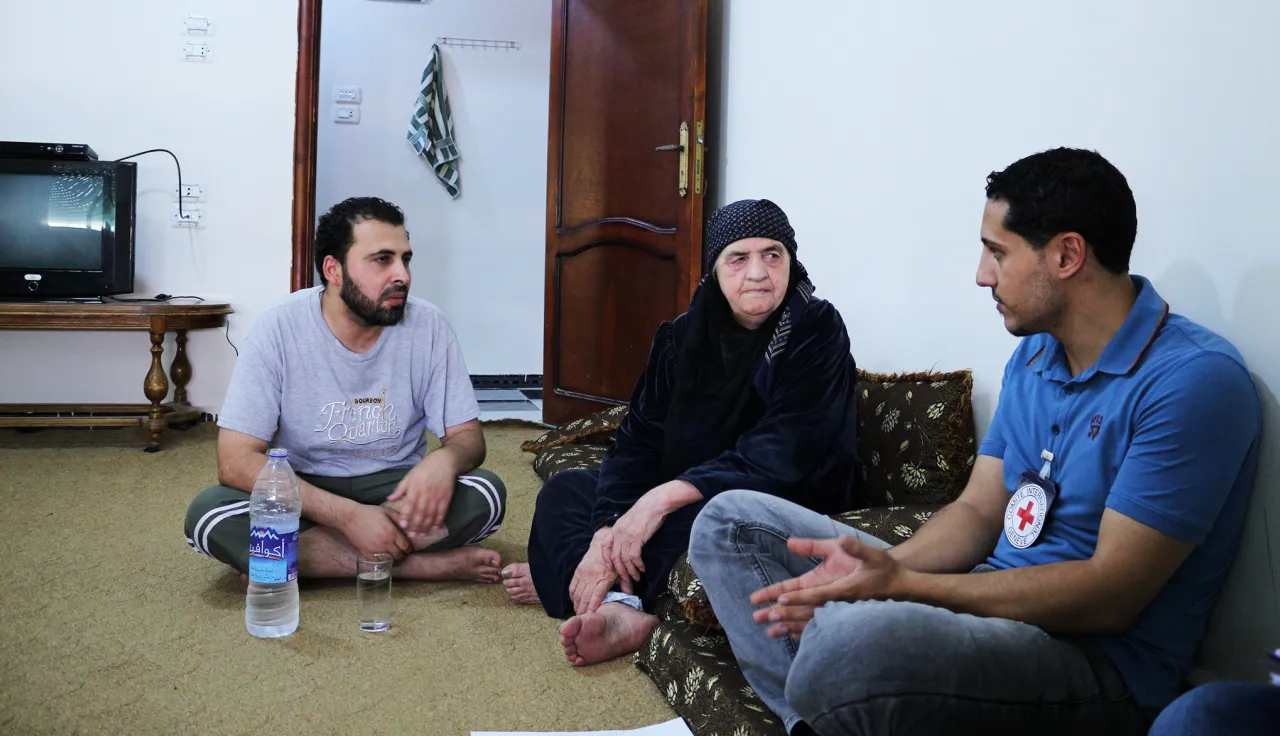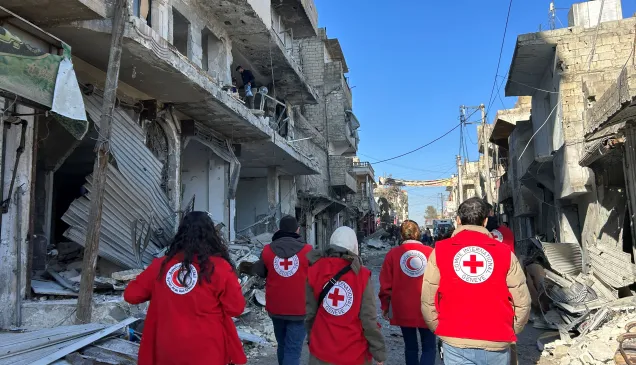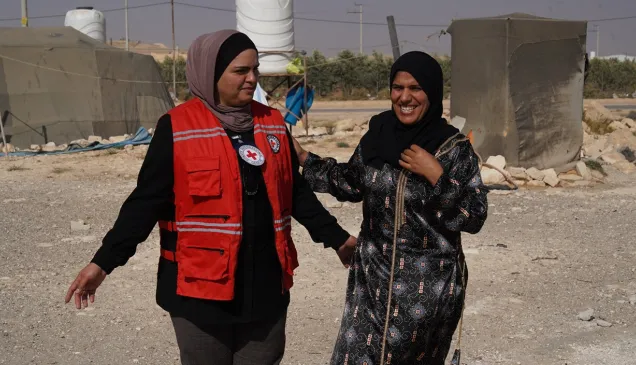Jordan: ICRC continues to assist Syrians at the northeastern border

With the Syrian crisis showing no signs of abating, people continue to cross into Jordan through the northeastern border seeking safety and international protection. The vast majority are children, women and the elderly who initially live in makeshift shelters in difficult conditions at the border.
The International Committee of the Red Cross (ICRC) continues to provide them with food, water, hygienic items and basic medical supplies. It also helps them restore family contact with their relatives in Jordan and elsewhere. Once they are allowed to proceed further into Jordan, people are accommodated temporarily at four ICRC-supported transit sites where their basic needs are attended to before they proceed to the Raba'a Al Sarhan Registration Centre.
"By the time they reach the border, most people are exhausted and desperately need help of all sorts," said Frédéric Fournier, head of the ICRC delegation in Jordan. "In addition to food and water, which the ICRC is doing its utmost to provide on a daily basis, the ICRC strives to ensure that those needing urgent medical attention, including pregnant women or those affected by chronic diseases, can quickly access proper medical care inside the country."
During the past three months, the ICRC has distributed more than 360,000 meals and trucked 6,600 cubic metres of potable water to the people in the northeastern border area.
Facts and figures – July through September
Emergency aid
- The ICRC distributed around 360,000 ready-to-eat meals, 10,500 ready-to-use supplementary food sachets, 280,000 packets of high-energy biscuits, 17,000 kilograms of dates, 2,000 bottles of shampoo, 12,100 soap bars, 80,000 diapers, 94,000 sanitary pads, 800 jerry cans, 220 blankets and 150 mattresses in the northeastern border area.
Water and sanitation
- The ICRC trucked 6,600 cubic metres of potable water to Hadalat, Rukban, Bustana and Ruwayshid transit sites in the northeastern border area for drinking and domestic use as well as to the berm, the area marking the borders between Jordan and Syria near Hadalat and Rukban, where Syrian refugees are waiting to transit into Jordan. Water facilities at the four transit sites and the berm were also upgraded.
- The ICRC provided maintenance and cleaning services for the shelter caravans, tents and sanitation facilities at Hadalat, Rukban, Bustana and Ruwayshid transit sites.
Health
- The ICRC provided medical supplies and equipment as well as technical support to the Royal Medical Services at four health posts offering health care to newly arriving Syrians in Hadalat, Rukban, Bustana and Tal Shihab.
- At the ICRC-run medical facility at Raba'a Al Sarhan Registration Centre in Mafraq, some 4,850 Syrians received medical screening, 1,440 benefited from clinical services and 240 were transferred by ambulance to other health facilities, in cooperation with the Jordan Red Crescent Society (JRCS).
- The ICRC held 33 basic first-aid training sessions for 1,120 Syrian refugees in Zaatari camp and one such session for 15 Civil Defence members in the southern district of Al Hasa.
- The ICRC organized a 'Health in Detention' round table and seminar for 44 representatives from the Ministry of Health and the Correctional and Rehabilitation Centres Department, to discuss how to improve access to health care for detainees in Jordan.
Restoring contact between family members
- With support from JRCS volunteers, the ICRC offered free-of-charge local and international telephone calls so that around 14,300 Syrian refugees in Zaatari and Azraq camps could maintain contact with family members in Syria and elsewhere.
- ICRC teams transmitted around 1,760 "safe and well" messages from Syrians at the northeastern border area to family members in Jordan, Syria and other countries.
- The ICRC issued around 500 travel documents to refugees granted resettlement in third countries.
Working in partnership with the JRCS
- Some 3,100 Syrian families living in host communities in Mafraq and Madaba governorates, the majority of whom are female-headed households, received monthly cash assistance.
- The ICRC organized first-aid training sessions for around 325 Syrian refugees in Mafraq governorate.
Promotion of international humanitarian law (IHL)
- The ICRC organized two IHL training sessions in Amman on the conduct of hostilities for those involved in the Syrian conflict. Issues related to the protection of the civilian population, management of dead bodies and searching for missing persons were also raised.
- The ICRC conducted training-of-trainers course on International Standards on Policing and Response to Sexual Violence for 17 police officers from the Peacekeeping Operations Training Centre in Jordan, and on the Law of Armed Conflict for 18 members of the Jordan Armed Forces at the Peace Operations Training Centre.
For further information, please contact:
Hala Shamlawi, ICRC Amman, tel: +962 777 398 794
Dibeh Fakhr, ICRC Geneva, tel: +41 22 730 37 23 or +41 79 447 37 26
Photos: CC BY-NC-ND/ICRC/Aya Ali and Asil Sari



